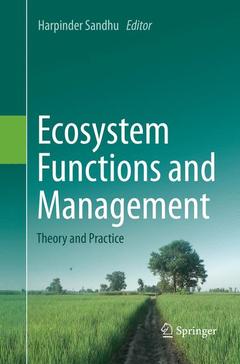Ecosystem Functions and Management, Softcover reprint of the original 1st ed. 2017 Theory and Practice
Coordonnateur : Sandhu Harpinder

This is the first book to provide vital information on key local ecosystems, their functions, state of health, and their role in development in an Asian context, particularly on the Indian subcontinent. It addresses six major ecosystems on the Indian subcontinent ? mountain, rural, desert, forest, urban, and freshwater ? and discusses their functions, how they support livelihoods and the economy, the impacts on ecosystem services, and management issues. Asia is home to nearly one third of the global population. With massive industrialization occurring at an increasing pace to support the lifestyles of a growing population, impacts on natural ecosystems are inevitable in this region.
The book also explores the concepts, theory and practice regarding these key ecosystems by linking them with the livelihoods of a large population base and subsequently illustrating their importance for sustainable development in the region. Further, by suggesting policies and ways in which these systems can be maintained and enhanced, it facilitates better management of natural resources within the ecological constraints to achieve socio-economic objectives and move towards a green economy for sustainable and equitable development in the region.
Introduction.- Part A.- 1. Theory and practice of ecosystem functions and management.- 2. Economic systems and ecosystems: Interlinkages, co-evolution or disparate movement?.- Part B.- 3. Interactions between humans and ecosystems in Himalayas of India and its socioeconomic and ecological consequences: An ecological modelling approach.- 4. Ecosystem services and agriculture in Punjab, India.- 5. Desert ecosystem management: a sustainable and wise use.- 6. Forest ecosystem: functions, value and management.- 7. Urban ecosystems: functions, value and management.-8. The Hydro-institutional challenge of managing tanks: a study of tanks in rural Andhra Pradesh.- Part C.- 9. Interlinking ecosystems for multiple benefits .- 10. Sustainable ecosystems and the role of business.- Epilogue: Designing sustainable ecosystems in South Asia.
Harpinder Sandhu is a transdisciplinary scientist whose research interests include studying the interactions between society and the natural environment to achieve sustainability. His research involves the integration of environmental economics and ecology to achieve a better understanding of the complex socio-ecological and economic dimensions of ecosystem services and their implications for equitable and sustainable development. His current research focus is on integrating an ecosystem services approach with the capability approach to address development agendas. Harpinder is further interested in establishing a bridge between the natural and social sciences by incorporating ecosystem services issues to address the gap between science and policy for sustainable urban and rural landscapes.
Harpinder received his PhD in Agroecology from Lincoln University, New Zealand and is currently affiliated with the School of the Environment, Flinders University, Australia. Harpinder is contributing as a Lead Author to an ongoing United Nations Project—Intergovernmental Platform on Biodiversity and Ecosystem Services (IPBES) for two deliverables 3a (Pollination Assessment) and 2b (Asia Pacific Regional Assessment of Biodiversity and Ecosystem Services). He also heads the Global Sectoral Group on Agricultural Production Systems and Thematic Group on Poverty Alleviation at the Ecosystem Services Partnership (ES-Partnership), which is coordinated by the Environmental Systems Analysis Group, Wageningen University, the Netherlands. Harpinder was nominated to the advisory panel of the Multi-Stakeholder Consultation on Agroecology for Asia and the Pacific at the Food and Agriculture Organisations of the United Nations. He is also a contributing expert to the Biodiversity and Ecosystem Services Network (BES-Net) Asia Pacific, part of the United Nations Development Program (UNDP).
Focuses on the six key ecosystems in an Asian context, thereby advancing our understanding their role for sustainable development
Offers students and practitioners an update on ecosystem functions and management
Presents and compiles information and the latest data and analyses on the value of ecosystems in Asia
Includes supplementary material: sn.pub/extras
Date de parution : 07-2018
Ouvrage de 220 p.
15.5x23.5 cm
Disponible chez l'éditeur (délai d'approvisionnement : 15 jours).
Prix indicatif 158,24 €
Ajouter au panierDate de parution : 03-2017
Ouvrage de 220 p.
15.5x23.5 cm
Disponible chez l'éditeur (délai d'approvisionnement : 15 jours).
Prix indicatif 158,24 €
Ajouter au panier


